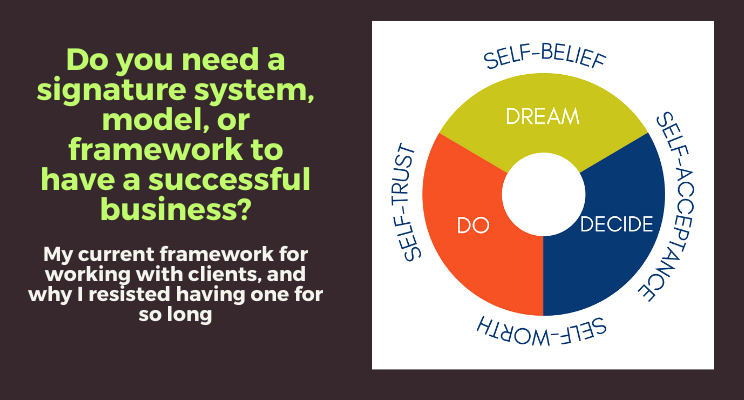My current framework for working with clients, and why I resisted having one for so long

Why is this article so hard to write? Every time I’ve tried over the past few months I’ve given up and written something else instead. The framework is easy, and it’s how I work with clients every day, so what is it about writing this that has me stumped?
Whenever this happens, I try to ask myself “Do I actually believe in or agree with what I’m about to share?” Then I look at what the conventional wisdom is, and if I’m just perpetuating a false narrative. In this case, the more I think about it, the more I realized that following a framework has always stressed me out. I don’t have a good memory for things like this (possibly because my Protector erases my mind when I’m trying to follow something exactly right) and when I try to follow someone else’s framework I get very much in my own head about it. For example, as much as I love Myers-Briggs (MBTI) and I self-identify as INTJ very strongly, I couldn’t tell you a thing about each individual letter or any other type, because my brain just doesn’t retain that information no matter how many times I read about it.
I created this framework for how I work with my clients, because all marketers (including me) will tell you that having a framework helps people trust you. It makes it very easy to explain how you do your work, and people can see the path they’re going to be on when they see your framework. I believe all of this. It also helps a lot of people structure their business more clearly when they can see their process laid out, and it helps build packages and services that make sense. My clients have had massive ah has when I’ve worked with them on their own signature system, and many still use those frameworks years later.
And yet, I’ve resisted doing one myself forever. If you would have seen my courage-based plan for the entirety of last year, creating a framework was on it. What the heck?!?!
I think I just don’t want to feel boxed into something. I don’t want a client to start working with me, thinking this is all going to be a neat and tidy process, only to find out it’s messy and might go in lots of different directions. I don’t want someone to think that in three months they will make it through this cycle. I’ve also always been afraid of making something like this permanent because every week I seem to learn something new which improves the way I work with clients (for example, my newest rabbit hole of research is around working with people with ADHD, since more and more I’m seeing traditional coaching methods fall short when working with my many neurodiverse clients).
So, I’ve decided I’ll share this framework with you so you can see how I tend to work with clients as of July of 2022. I want to give everyone the permission to come up with a framework if you find it helpful, then decide not to use it, not to share it, or change it as you see fit. It is simply a tool that could make your work easier and clearer, or (and) it could trigger all sorts of self-doubt and fear. Both are completely okay.
The Dream, Decide, Do Framework

I believe that everyone can have their business exactly the way they want to have it. We just have to figure out what that is, and make it happen.
That’s really the crux of the framework. In a nutshell, I give clients the space to dream about what they want, we work through their values and desires, then we decide what path to take forward. Sometimes this takes 15 minutes, and sometimes it takes weeks or months. The actual “doing” part is where we get to see all the interesting things happen. The doing might bring us back to rethinking our dream, or it might need a different path to get there. We often jump around between the three phases as we get new information day-by-day.
During all of that, self-doubt is almost inevitably going to show up. That’s where Self-Belief, Self-Acceptance, Self-Worth, and Self-Trust come into play. These are resources from your healthy self that you can pull from as you’re working through your goals. They are always present and available to you when you need them (but we usually have to coax them out slowly over time).
To recap: Yes, frameworks can be super helpful in your business and totally could be the thing that makes you wildly successful. No, it’s not a pre-requisite to thriving as an entrepreneur and you could absolutely opt out of having one if you don’t want one. This is where experiments come into play; you could try to create a signature system, and you could even try to share it. Until I shared mine, it was all fine and good. I was happy with it. But when I decided to share it I learned a lot because I started to notice the feelings that came up. That is the power of experiments and listening to your intuition in your business.
Looking for an alternative to the mainstream business advice you read online? Stephanie gives you practical, ADHD-friendly guidance to do business on your own terms. No nonsense, thorough, and immediately useful, these weekly emails cut to the chase of what you really need to succeed without compromising your values or working yourself into the ground. To get articles and behind-the-scenes business insights delivered right to your inbox, subscribe to her weekly Permission Slips here.



